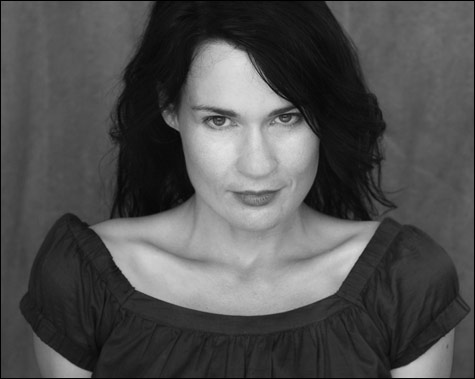
CREATING A PLACELESS PLACE: Jan Elizabeth Watson. |
| Asta in the Wings | by Jan Elizabeth Watson | Tin House Books | 320 pages | $14 |
Jan Elizabeth Watson was reluctant, at first, to set her dreamy first novel in Maine, afraid of marginalizing herself as a "Maine writer." That she opted for it in the end, however, puts her at no risk of being considered a regionalist. The Maine in Asta in the Wings is more an atmosphere than a physical place: austere, isolated, peopled with proud outsiders and unconventionals — and if you don't know the state, the phrase "from away," the peculiar, unhurried soft-vowelled accent, you'd have even less sense of where the events unfold.

The impression of placelessness could've been a fault in another book. But here, Watson creates a dislocation that matches the experience of her young heroine. Seven-year-old Asta and her sickly nine-year-old brother Orion, a precocious set of siblings, have been imprisoned by their theatrical, troubled mother. She isolates them from the world — home-schooling, doors locked from the outside, windows blocked with tar paper — with warnings of deadly plagues that rage just beyond the walls of their house; when Asta imagines venturing outside, she pictures "human bodies piled as high as [her] waist." [64] It's not as ominous as it sounds though; Asta and her brother seem well satisfied with their situation.
Not having experienced any other way of life, Asta does not, needless to say, know what she's missing. "Can you tell me more about the winter?" she asks her brother, who did spend a bit of time in school, surrounded by "flu or the measles, or head lice, whatever those kids had." [34] When their mother doesn't come home from work one evening, ultimately to end up in an asylum, the two kids chance upon an escape route, and head out into the snow to search for their mom. Just as Asta hasn't known life beyond her house, nor does she understand that her mother is not going to take home any blue ribbons for parenting skills. And as a result, she registers no ill-will, anger, or frustration.
Which wouldn't be so odd if the story were told through Asta's seven-year-old perspective. But it's not. It's an Asta of indeterminate age looking back. Herein lies the book's great flaw. We aren't inserted directly into the mind of a kid, nor do we know anything about the (presumably) adult Asta. As a result, the narration feels too sophisticated to adequately get lost in the sense that this is a child experiencing the world for the first time. If Watson had given us a better sense — any sense at all — of the current Asta's situation, we'd know it was an adult recalling this series of events, able to provide a more mature lens of analysis.
But because she doesn't, lines like: "I tried to think about what made me uniquely Asta — what made me uniquely seven years old" [265] feel false. We get neither genuine childhood wonder nor the ways in which the experience impacted the adult Asta's life. Even a gifted, readerly kid wouldn't have the capacity of self-awareness that Watson allows Asta. "His eyes shone black behind his glasses, with no hint of irony in them." [286] What second-grader is going to detect — and be able to name — irony? The adult is not fleshed out enough to make the childhood ring true.
Watson is at her best with the side-characters that enter Asta's life after her mother abandons her, particularly the ambiguous Leon, a college-age photographer who befriends Asta. Watson suggests that it's a problematic dynamic, but subtly, creating a real sense of allure. Despite the question of perspective, this sort of feeling — the mysteries and ambiguities that Watson creates, raising questions and not trying to answer them — is what powers the novel.
Nina MacLaughlin can be reached at nmaclaughlin@thephoenix.com.
JAN ELIZABETH WATSON | at Books Etc., 38 Exchange St, Portland | February 6 at 6 pm | Free | 207.774.0626